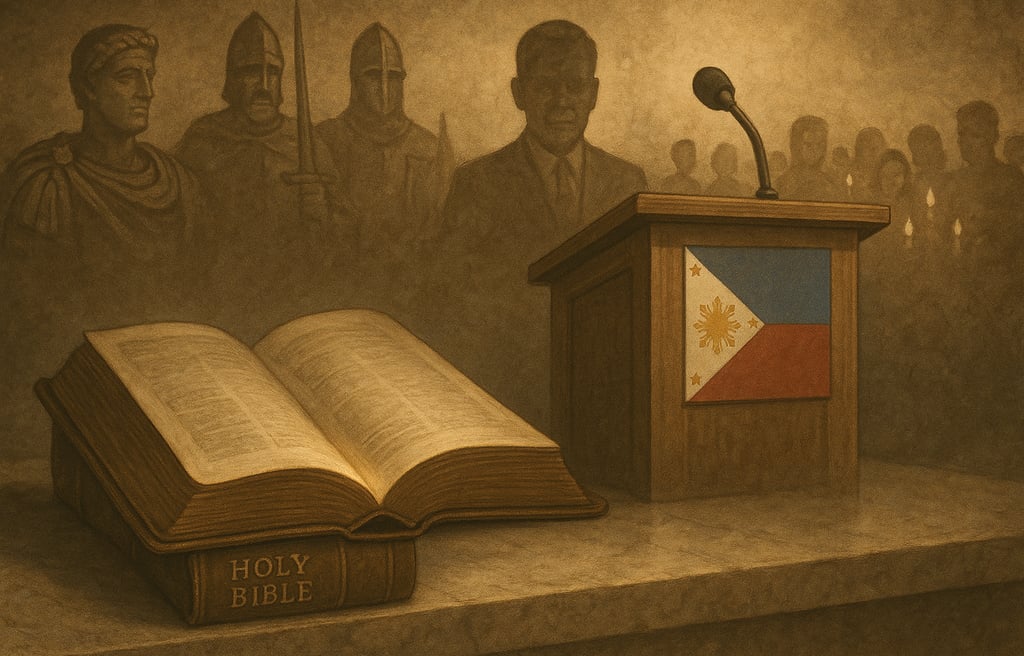The Divine Playbook: How the Bible and God Have Been Used as Political Tools
This in-depth analysis reveals how the Bible, a symbol of faith, has been used throughout history as a powerful political tool by leaders in times of war, crisis, and nation-building. Exploring events from Constantine to Philippine People Power, the article examines how invoking God shapes politics, government policy, and public opinion. Discover why understanding this enduring strategy is essential for protecting true democracy and freedom of belief.
7 min read


If you’ve tuned in to a political speech, scrolled through campaign news, or listened to neighborhood debates, you’ve probably noticed one thing: leaders love to mention God.
The Bible is quoted on stage and in the streets, not just by pastors but by mayors, presidents, and senators. Many accept this as normal. But behind the scenes, invoking religion is more than tradition—it’s a proven way to control, convince, and even divide.
Faith isn’t the issue here.
The real story is how religion turns into a political tool—influencing laws, justifying wars, even shutting down criticism. From ancient emperors to modern campaigns, history tells a story of belief mixed with strategy, sacred texts doubling as political weapons.
What follows is a look at the facts: how leaders have used God and the Bible to shape power. And what ordinary citizens—especially those who value democracy and real justice—should learn from it.
Constantine: The Moment Religion Became State Power
When Constantine faced the Milvian Bridge in 312 AD, legend says he saw a vision—“In this sign, conquer”—and went to war believing he had God’s blessing. His victory wasn’t just military; it was spiritual. Constantine credited the Christian God and turned Christianity from an outsider religion into the heart of empire, tying political authority to faith. Critics became rebels not just against the emperor but against God Himself.
This move set a template that would echo across centuries. Rulers tied themselves to heaven, making their word seem unchallengeable. The church gained influence, but only under the shadow of imperial power—a pattern that blurred the boundaries between moral law and government order.
The Divine Right of Kings: "God Made Me Rule"
As power shifted through Europe, kings sharpened Constantine’s legacy. They declared their rule to be divinely ordained, often quoting scripture to make their point. When a king faced opposition, he didn’t just defend his throne—he claimed resistance was a crime against God. Some monarchs relied on the ambiguous power of the Bible: a verse could mean whatever suited the needs of the day.
This doctrine shaped society’s view of leadership. Compliance was seen as religious virtue. Rebellion was cast as sin. Across generations, the pulpit and the throne kept reaffirming one message: challenge authority and you risk eternal consequences.
The Crusades: Holy War as Political Tool
Roughly a millennium after Constantine, Pope Urban II stood before crowds and called for a crusade to reclaim Jerusalem. With the words “God wills it!” he transformed a geopolitical conflict into a mission of the soul. Ordinary knights and peasants flocked toward war with the hope of spiritual salvation—believing that violence, for the right purpose, brought heavenly reward.
Over two centuries, crusades devastated entire regions. The line between holy duty and worldly ambition quickly blurred. Sometimes faith drove the fighters; sometimes promises of wealth or power were the real incentives. For political leaders, religion was the lever that moved armies and made conquest feel sacred.
Manifest Destiny: God Blesses American Conquest
Centuries later, as the United States pushed westward, preachers and presidents told Americans that expansion was their divine right—the doctrine of Manifest Destiny. Across wild frontiers and broken treaties, faith legitimized the displacement of Native Americans. Boarding schools erased languages and traditions, telling children that salvation meant forgetting their ancestors.
Even in the Philippines, American rule arrived dressed in Christian language. President McKinley spoke of his “duty” as a Christian to “uplift and Christianize” Filipinos. The irony, mostly lost on the leaders, was that the Philippines long practiced Catholicism. Here, faith became not just a comfort but a tool for justifying control.
Invoking God: Stories from Power and Politics
Leaders in every age have found opportunity in the language of faith. Constantine’s story is only the first chapter.
During the Middle Ages, papal calls to holy war inspired crusades with the promise of redemption. In revolutionary America, Patrick Henry appealed to “a just God” to rally support for independence. Abraham Lincoln, torn between warring states, reminded his divided nation that both North and South prayed to the same God—a powerful reminder that no one owns divine favor.
Fast forward to the modern era: George W. Bush invoked God’s guidance after 9/11. Decisions of war and peace became framed as spiritual tasks. Boundaries between statecraft and the sacred faded into background noise.
In Iran, Ayatollah Khomeini led a revolution justified by scripture, restructuring a country around religious ideals.
The Philippines saw its own spiritual revolution at EDSA in 1986, where prayer and protest joined forces to topple dictatorship. Everyday politics here still echo with public prayers, religious rhetoric, and leaders claiming God is on their side.
No matter the nation, the message is familiar. Turning to God brings moral weight to every action, makes criticism seem profane, and transforms ordinary policy into the work of the divine.
The Modern Pulpit: How Politicians Use God Today
Stand in any crowded rally, and notice how faith still anchors public life. Politicians quote scripture on the campaign trail, ending speeches with “God bless the Philippines” or promising that a law will bring divine favor. In the heat of public debate, lines blur: arguments are baptized, policies sanctified.
For citizens, this creates a kind of shield around authority—a sense that some decisions live above question. When dissent is cast as skepticism of faith, real debate shuts down. Who can argue with the will of God?
This isn’t always cynical manipulation. In chaotic times, people crave certainty. A leader who sounds devout brings comfort. Religious language offers both assurance and justification, even when facts are thin or challenges mounting.
Yet, the risks become clear: when spiritual and political identities merge, admitting mistakes gets harder. Failed policies are defended as divinely inspired, dissenters painted as enemies of God, and compromise fades from the national conversation.
These patterns are not unique to the Philippines. In India, Brazil, Turkey, and the U.S., nationalist movements and populist leaders increasingly rely on religious rhetoric, dividing societies along lines of faith and belonging.
Why This Works: The Mechanics of Religious Political Power
Through centuries, the trick repeats itself. Political actors exploit five main levers:
Moral authority: Policymakers who claim God’s blessing make their actions nearly untouchable. It’s not just disagreement—it’s defiance of the sacred.
Powerful networks: Religious communities form deep bonds. Politicians can mobilize these networks at a moment’s notice, trusting the trust built in churches, mosques, and temples.
Interpretive advantage: Holy texts offer endless room to maneuver; a leader can pluck a phrase, shape it to fit, and then silence opposing views as heresy.
Identity lock-in: Once politics becomes religion, group loyalty trumps evidence. Citizens defend policies for their faith, not just for practical reasons.
Emotional appeal: Especially in moments of crisis, spiritual promises comfort people and reduce anxiety about the future. “God will provide”—or punish.
Theocracies and Religious Nationalism: Faith as State Policy
Some societies formalize these relationships. Iran’s leaders insist all law must follow Islamic tradition. Saudi kings rule under the approval of religious clerics. Pakistan enforces blasphemy laws so strict that criticizing government can be treated as a religious crime.
Democracies play similar games. In Israel, religious identity shapes who gets full citizenship. India’s government prioritizes Hindus, offering benefits to some and excluding others. These not-so-hidden hierarchies tell us: you don’t have to build a theocracy to make faith into political capital.
Colonial empires, too, spread Christianity as a prelude to conquest. Missionaries often arrived first, teaching local converts that their communities were backward or sinful, laying the groundwork for economic takeover and cultural loss.
What Should Concern You
Despite these risks, religious rhetoric in politics is not fading. Governments that claim God’s approval push back against criticism and accountability. Dialogue shrinks or vanishes. Minority groups soon find themselves squeezed, their voices cast as threats to the “true” faith of the nation.
For Filipinos, this lesson matters. Political figures invoke God for comfort, legitimacy, and power; but their appeals should always be questioned. Do these statements serve the people, or do they simply protect the powerful?
The Question We Must Ask
This leaves us with a final question: What does it mean when leaders need God’s name to bolster their rule? Is it faith, or is it a way to quiet discomfort, deflect blame, and avoid hard truths?
Solid leadership owns its decisions, welcomes debate, and admits when it makes mistakes. Real faith seeks justice, not just power. When politicians invoke the divine, it’s up to us—citizens, thinkers, doubters—to keep our eyes open.
The Bible and God have served as political tools for centuries. That’s not likely to change soon. But by understanding these patterns, insisting on reason and justice, and demanding honest dialogue, perhaps we can protect what’s most vital: both our democracy and our faith.
SOURCES:
The Politics of Faith in Constantine's Rome - https://retrospectjournal.com/2025/10/19/the-politics-of-faith-in-constantines-rome/
Divine right of kings - https://en.wikipedia.org/wiki/Divine_right_of_kings
Crusades Justification Arguments by: Theos Team - https://theosu.ca/2021/12/31/crusades-justification-arguments/
Crusades - https://en.wikipedia.org/wiki/Crusades
Making Sense of the Divine Right of Kings - https://daily.jstor.org/making-sense-of-the-divine-right-of-kings/
Manifest Destiny: An American Ideology - https://exploros.com/students/lessons/manifest-destiny-an-american-ideology
Spanish-American and Philippine-American Wars (1898–1902) - https://encyclopedia.adventist.org/article?id=8FGT
Justification For The Philippine-American War Essay - https://www.cram.com/essay/justification-for-the-philippine-american-war/PJCCDXW9WWV
Methodist narratives, religious justification and the Philippine-American War - https://ukdr.uplb.edu.ph/items/6e6ed4f3-3b83-4772-81e1-ad2ec19def79
Religion and Political Power - https://academic.oup.com/book/38088/chapter/334888599
Faith, Power, and Politics: How Religious Fundamentalism Manifests in Modern Society - https://actalliance.org/2025/10/16/faith-power-and-politics-how-religious-fundamentalism-manifests-in-modern-society/
Religion and the 2024 Presidential Election - https://prri.org/research/religion-and-2024-presidential-election/
Christian nationalists - wanting to put God into US government - https://www.bbc.com/news/world-us-canada-63937346
Supreme Court signals further erosion of separation of church and state - https://www.npr.org/2021/12/07/1062222894/supreme-court-signals-further-erosion-of-separation-of-church-and-state
Religion and Politics: Integration, Separation and Conflict - https://www.irenees.net/en/resources/bdf_fiche-analyse-1177_en.html
Iran v Saudi Arabia: Government & Ideology - https://iranprimer.usip.org/resource/iran-v-saudi-arabia-government-ideology
Theocracy Countries 2025 - https://worldpopulationreview.com/country-rankings/theocracy-countries
Populism, Religion, and Secularity in Latin America and Beyond - https://www.multiple-secularities.de/media/dynamic/files/295/Populism,_Religion_and_Secularity_in_Latin_America_and_Beyond.pdf
The politics of blasphemy: Why Pakistan and some other countries prosecute religious speech - https://theconversation.com/the-politics-of-blasphemy-why-pakistan-and-some-other-countries-prosecute-religious-speech-199443
Religion and Political Economy in History (Part I) - https://broadstreet.blog/religion-political-economy-in-history/
Christianity and colonialism - https://en.wikipedia.org/wiki/Christianity_and_colonialism
Colonialism facts and information - https://www.nationalgeographic.com/culture/article/colonialism
CHISTIAN MISSIONS AND COLONIAL RULE IN AFRICA - https://eujournal.org/index.php/esj/article/view/13170
Turkey: Erdoğan's Authoritarian Turn - https://globalchallenges.ch/2025/08/21/turkeys-authoritarian-turn/
Abraham Lincoln’s Second Inaugural Address - https://www.loc.gov/exhibits/treasures/trr036.html
Give Me Liberty or Give Me Death! - https://www.history.org/almanack/life/politics/giveme.cfm
Joan of Arc: Religious and political legacy - https://www.britannica.com/biography/Saint-Joan-of-Arc
Pope Urban II’s Speech at Clermont - https://sourcebooks.fordham.edu/source/urban2-fulcher.asp
Adolf Hitler and Nazi religious rhetoric - https://encyclopedia.ushmm.org/content/en/article/religion-in-nazi-germany
George W. Bush, War, and Religion - https://www.theatlantic.com/magazine/archive/2003/10/faith-in-the-white-house/302781/
Ayatollah Khomeini and the Iranian Revolution - https://www.britannica.com/biography/Ruhollah-Khomeini
People Power Revolution, EDSA 1986 - https://www.officialgazette.gov.ph/edsa-people-power-revolution/
The Bible as a political weapon: When “Thus says the Lord” becomes an argument - https://st.network/analysis/the-bible-as-political-weapon/
War and the Will of God | Christian History Magazine - https://christianhistoryinstitute.org/magazine/article/war-and-the-will-of-god
Religion, Rhetoric, and Running for Office - https://digitalcommons.sacredheart.edu/sociology_fac/20
Religious references in political campaigning - https://www.frontiersin.org/articles/10.3389/fcomm.2021.658011/full
Populist Rhetoric and Political Polarization: Insights from Latin America - https://journals.sagepub.com/doi/full/10.1177/20531680241201391
Contact us
subscribe to morning coffee thoughts today!
inquiry@morningcoffeethoughts.org
© 2024. All rights reserved.
If Morning Coffee Thoughts adds value to your day, you can support it with a monthly subscription.
You can also send your donation via Gcash: 0969 314 4839.
